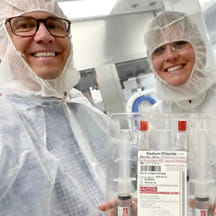Laura Bray considers herself an optimist.
Perhaps there's no other way to describe someone who has endured a parent's nightmare scenario. The life-saving cancer medication needed to treat her daughter, Abby, was not available—and she took this challenge as a calling to tackle a problem she was uniquely positioned to solve.
"It was fortuitous that those were the challenges we faced," says Bray, chief change maker, Angels for Change. "It's not acceptable for a doctor to not have the tools they need when they need them—I had to be part of the solution."
Shortage leads to mission
At the time, the only thing on Bray's mind was finding a way to obtain the Erwinaze—a chemotherapy treatment for patients with acute lymphoblastic leukemia—essential to her daughter's survival.
As a business professor who taught supply chain management, she had no idea drug shortages like the one for Erwinaze occurred with such regularity and duration in the pharmaceutical supply chain. She was told the drug had been backlogged for four years, and she wasn't about to accept "no" as an answer.
Bray began calling anyone who would listen to her—hospitals, pharmacies, lawmakers and pharmaceutical companies. Ten days later, she had secured Abby's Erwinaze. But what about the thousands of other parents who faced similar circumstances and didn't have the resources or expertise to navigate the supply chain? Bray's mission was clear, and Angels for Change was born.
Angels for parents in need
Bray founded Angels for Change in 2019 to drive transformation of the life-saving drug shortage crisis through advocacy and awareness. To do so, she and her fellow "angels" focus on building relationships with patients and members of the pharmaceutical supply chain to end health care crises created by drug shortages.
Although she's relatively new to pharmaceutical supply chains, she's able to leverage her business acumen and the relationships she and her team have built to source crucial medications for other families facing shortages.
Desperate parents have found Bray through web searches and word of mouth connections; thus far, Angels for Change has helped the parents of more than 40 critically ill pediatric patients secure the medications they need.
Collaboration is crucial
Bray says no two drug shortages are the same, and there are many financial and regulatory pressure points along the supply chain that contribute to what the Food and Drug Administration has called a "broken marketplace." The key to fixing it, according to Bray, lies with all parties working in lockstep toward solutions.
"I believe in the goodness of the people working throughout the supply chain," Bray says. "All these parties are working individually to end shortages, yet things keep falling through the cracks. As a coalition of people working together, we can do it."
Angels for Change works to facilitate discussions. It hosts regular lunch-and-learn sessions and has held two summits for decision makers across the pharmaceutical supply chain, with a third summit planned for October 2021. The organization continues to grow its network of hospitals, pharmacists, providers and drug distributors to address individual shortages as they occur.
Goal: Eliminating the unthinkable conversation
In a perfect world, health care providers would always have easy access to the medications their patients need, though the complexities of the pharmaceutical supply chain may never make that fully possible.
But optimism abounds for Bray—she hopes that by resolving supply issues earlier in the process, caregivers may never have to put parents in the unthinkable position she found herself in two years ago.
"My dream is to eradicate these conversations happening at doctor and patient level; to do that, we have to resolve the shortage before it gets to the doctor," Bray says. "No patient should ever hear that we don't have the drugs needed to save you—and no physician should ever have to deliver those words."
For more information refer to an update by the United States Pharmacopeia group.


